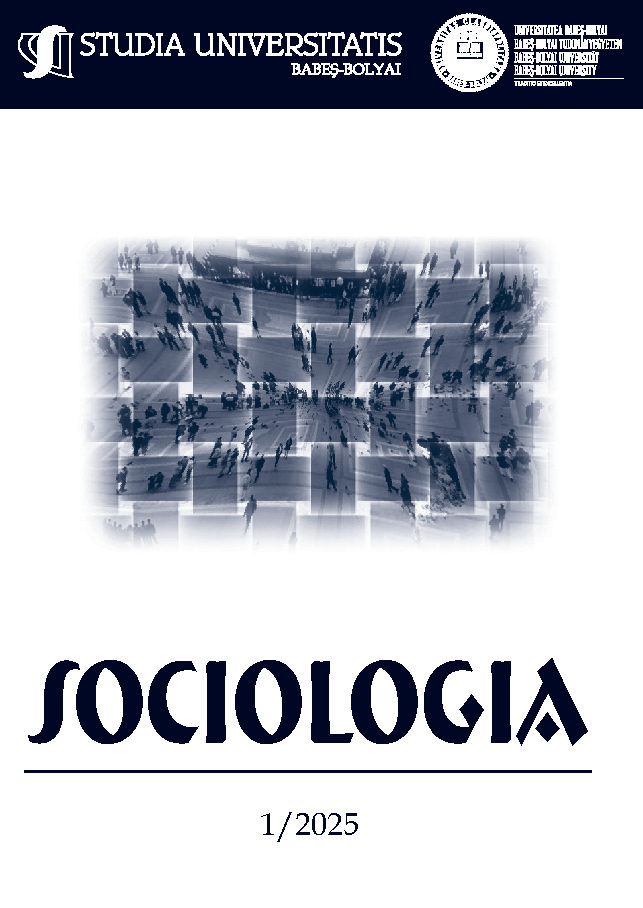WHEN CARE MEETS CAPITALISM: ORGANIZATIONAL WELLBEING IN ROMANIA
DOI:
https://doi.org/10.2478/subbs-2025-0006Keywords:
wellbeing, organizations, subjectivation, capitalism, sociologyAbstract
This paper presents a descriptive qualitative study of organizational wellbeing in Romania, asking: How is the field of workplace wellbeing organized? The analysis focuses on the actors, actions, and tensions that structure this emerging space and considers its broader implications. The theoretical framework draws on Foucault (biopolitics and subjectivation), Thévenot & Boltanski (justification through translation), and Boltanski & Chiapello (The New Spirit of Capitalism), framing wellbeing as a practice of governing subjectivity at the intersection of genuine care and managerial imperatives of efficiency and productivity. Empirical data comes from 12 in-depth interviews with HR professionals, wellbeing specialists, and external service providers. Findings reveal three coexisting worlds of justification: inspired, industrial, and market-based; between which actors translate ideas. Rather than opposing each other, the actors' positions in the process mark different stages in the reform of the spirit of capitalism. Organizational wellbeing thus emerges as a space of tension and collaboration, shaping the “well” employee: high-performing, autonomous, healthy, and engaged. The paper contributes to a critical understanding of organizational wellbeing as both support for employees and a subtle mechanism of control and reproduction of capitalist norms, while mapping its specific Romanian dynamics.
References
Abraham, J., & White, L. (2017). Tracking the changing landscape of corporate wellness companies. Health Affairs, 36(2), 222–228. https://doi.org/10.1377/hlthaff.2016.1158
Agarwal, P. (2020). Shattered but smiling: Human resource management and the wellbeing of hotel employees during COVID-19. International Journal of Hospitality Management, 93, 102765. https://doi.org/10.1016/j.ijhm.2020.102765
Aryanti, R. D., Sari, E. Y. D., & Widiana, H. S. (2020). A literature review of workplace well-being. In Proceedings of the International Conference on Community Development (ICCD 2020) (Vol. 477, pp. 1–6). Atlantis Press. https://doi.org/10.2991/assehr.k.201017.067
Babbie, E. (2010). The practice of social research (12th ed., p. 420). Wadsworth Cengage Learning.
Boltanski, L., & Chiapello, È. (2005). The new spirit of capitalism (G. Elliott, Trans.). Verso.
Boltanski, L., & Thévenot, L. (2006). On justification: Economies of worth (C. Porter, Trans.). Princeton University Press.
Bryman, A. (2012). Social research methods (4th ed., pp. 468–498, 564–588). Oxford University Press.
Burlakova, I., Volkova, E., Kryukova, E., & Stepanov, A. (2020). Features of corporate well-being. In Corporate management: From creation to success (pp. 142–154). Moscow: INFRA-M.
Chakraborty, S., & Mahanta, A. (2019). Employee wellbeing – Are organizations addressing it the correct way? IRA-International Journal of Management & Social Sciences, 14(2), 17–27. https://doi.org/10.21013/jmss.v14.n1.p3
Coppoletta, F. N., et al. (2024). Non-financial reporting in SMEs: A new approach to measure corporate well-being based on employee perception. Procedia Computer Science, 227, 507–514. https://doi.org/10.1016/j.procs.2023.12.085
Dale, K., & Burrell, G. (2014). Being occupied: An embodied re-reading of organizational “wellness.” Organization, 21(2), 159–177. https://doi.org/10.1177/1350508412473862
Foucault, M. (2003). Society must be defended: Lectures at the Collège de France, 1975–76 (M. Bertani & A. Fontana, Eds.; D. Macey, Trans.). Picador. (Original work published 1975–1976)
Global Wellness Institute. (2024). Wellness policy toolkit: Mental wellness. https://globalwellnessinstitute.org/mental-wellness
Iluț, P. (1997). The qualitative approach in social sciences – Concepts and methods (pp. 74–97). Polirom.
Mucchelli, A. (2002). Dictionary of qualitative methods in human and social sciences. Polirom.
Reid, D. (1985). Industrial paternalism: Discourse and practice in nineteenth-century French mining and metallurgy. Comparative Studies in Society and History, 27(4), 579–607. https://doi.org/10.1017/S0010417500011671
Watson, D., Wallace, J., Land, C., & Patey, J. (2023). Re-organising wellbeing: Contexts, critiques and contestations of dominant wellbeing narratives. Organization, 30(3), 441–452. https://doi.org/10.1177/13505084231156267.
Downloads
Published
How to Cite
Issue
Section
License
Copyright (c) 2025 Studia Universitatis Babeș-Bolyai Sociologia

This work is licensed under a Creative Commons Attribution-NonCommercial-NoDerivatives 4.0 International License.



